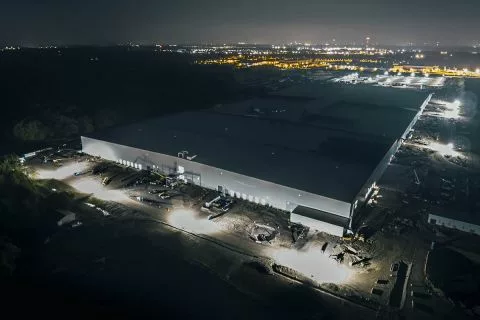Bills introduced this week in the state House continue to signal that Michigan’s expectations for its large-scale economic development spending — which tops $2 billion over the past three years — continues to move well beyond providing corporate subsidies.
Related:
Sponsoring Rep. Jason Hoskins, D-Southfield, said it is time to take a more “holistic approach to economic development.”
“For us, part of that conversation is about transit. It’s about housing. It’s about having communities that are vibrant and livable,” he said.
The plan would budget $600 million per year in dedicated corporate tax revenue over 10 years for traditional business attraction, alongside transit and other local investments that legislators say also will boost Michigan’s appeal to businesses.
“This is an economic development strategy that pulls together all of the critical components that we understand are needed to grow our state’s population and our economy,” Rep. Jason Morgan, D-Ann Arbor, told Bridge Michigan.
Elements of the plan — housing, infrastructure and transportation alongside a reduced spend on traditional economic development — fulfill “all of the things that we’ve been hearing from residents … that we need to be doing here in Michigan,” Morgan said.
The bills from the Democrat-led House follow similar Senate bills introduced in late 2023 after nearly a year of discussions and committee meetings led by Sen. Mallory McMorrow, D-Royal Oak, about overhauling the Strategic Outreach and Attraction Reserve (SOAR) Fund.
Michigan’s Republican legislators also have been looking at economic development reform, saying in April that they want to increase oversight of SOAR, along with adding performance-based funding for the Michigan Economic Development Corporation.
‘A serious look’
SOAR, founded in late 2021 in response to Michigan losing out on Ford Motor Company’s $11.4 billion electric vehicle battery investment, was fast-tracked by a bipartisan Legislature determined to win green energy jobs.
The incentive fund for the first time allowed Michigan to pledge hundreds of millions of dollars for massive development projects, along with hundreds of millions more toward preparing sites for the factories. The timing was critical for the surge in EV battery and semiconductor factory development.
Whitmer and the Michigan Economic Development Corporation have touted the fund and the billions of dollars in investments — along with promises of more than 10,000 jobs — generated through awards.
But nearly three years into the mega-spending program, questions have increasingly dogged it: The quality and pay of the jobs, the vetting of companies and whether the payback was worth the money.
A Bridge investigation published in March showed that Michigan pledged $335 million in economic development incentives in 2023 to 83 companies that planned to create 11,408 jobs. In all, 40% of jobs created pay less than the state’s average, and nearly 90% of incentives went toward manufacturing jobs, Bridge found.
With the House plan, Michigan would budget $250 million per year for the traditional economic development incentives intended to attract employers and create jobs — half as much as now. The budget plan also calls for:
Whitmer had been trying to pump another $500 million into SOAR and rebrand it as the Make it in Michigan program. She also had said she expected further conversations after the Senate passed its plan.
As for the new House plan? “We’re taking a serious look at it,” Whitmer said this week at the Mackinac Policy Conference.
Many components of the House plan have been considered by legislators over time, including transit, without a solution, she said. “So I think there’s a lot of promise to it (but) … we’re still diving in and looking at it.”
House Minority Leader Matt Hall, R-Richland Township, said Thursday that
Republicans have been open to conversations about SOAR reform.
“We can make our economic development programs more accountable and transparent,” Hall said. “We should embrace … changes because it will work better for the taxpayer.”
A ‘step further’
The earlier Senate SOAR reform plan, called Michigan 360, looked to direct community funding in areas where a company also was getting a large incentive to broaden the benefits.
The House plan goes “a step further,” said McMorrow, who credited the lower chamber with building consensus.” She noted the governor “responded positively … that this comprehensive approach is in the right direction.”
Meanwhile, dedicated mass transit funding “with a coordinated approach over a long term will be transformational,” said Ned Staebler, vice president of economic development at Wayne State University and a board member of the Detroit-based Regional Transit Authority.
Improved bus systems improve quality of life, but also economic growth prospects, Staebler said. Adding bus rapid transit or fixed rail would take that further, he said, and the 10-year funding plan raises hopes that either could be a next step.
At the same time, setting up a decade’s worth of dedicated funding also would appeal to the business community, Jeff Donofrio, CEO of Business Leaders for Michigan, told Bridge.
The business advocacy group has long sought longer-term planning for the state, which Donofrio has said see-sawed between policy approaches. Education and economic development have been particularly vulnerable to changes among administrations.
“The consistency message …is coming through often right now,” Donofrio said. “The conversation is trending toward a (longer-term) approach toward driving outcomes, not individual tactics.”
A 10-year approach to economic development, Donofrio said, “would be something very different.”
Meanwhile, the House said that it expected to create additional accountability to the process of awarding projects. That element was important to Republicans, they have said.





